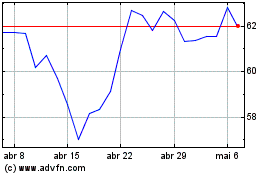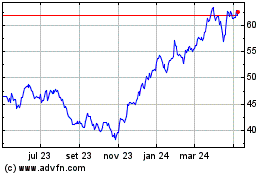Citigroup Gets Lift From Consumers, as Trading, M&A Slow -- WSJ
16 Julho 2019 - 4:02AM
Dow Jones News
Bank beats analysts' expectations as one-time gain lifted EPS
and trading revenue
By Telis Demos
This article is being republished as part of our daily
reproduction of WSJ.com articles that also appeared in the U.S.
print edition of The Wall Street Journal (July 16, 2019).
Strong U.S. consumer banking gave Citigroup Inc. a boost in the
second quarter, helping it overcome slow trading and corporate
activity.
Citigroup said Monday its second-quarter net income rose 7% from
a year ago. Quarterly profit was $4.8 billion, from $4.5 billion
from a year ago. Per-share earnings were $1.95 a share. Analysts
had expected $1.81 a share.
Revenue at the bank was $18.76 billion, up 2% from $18.47
billion a year ago. Analysts polled by Refinitiv had expected $18.5
billion.
Citigroup is the first of the big U.S. banks to report
second-quarter results. The New York bank and its rivals have been
under pressure in recent months. On the Wall Street side of the
business, tepid market volatility is hurting trading desks. On the
Main Street side, banks are grappling with the prospect of lower
interest rates. The Federal Reserve had been raising rates since
late 2015, which boosted banks' lending profitability. But the
central bank is now signaling it is ready to cut rates.
"We're clearly pivoting from an environment where we had
predicted...rising rates to this point," Chief Executive Michael
Corbat told analysts. "From our perspective we don't believe that
the market has made that full adjustment."
Trading revenue at Citigroup was up 4% to $4.1 billion, but that
included a one-time gain on the bank's stake in a trading platform.
Without that gain, Citigroup's core trading revenue declined 5%
from a year ago.
On that basis, it would be the third straight quarter of
declines in the trading unit. Banks have warned that despite record
stock markets, clients have remained cautious and weren't paying
their banks to help them put on big new bets.
The one-time gain in trading also flattered the bank's earnings
per share. Without it, the bank would have earned $1.83 per
share.
Overall corporate and institutional banking revenue was flat for
the quarter, at $9.72 billion. Investment banking revenue fell 10%,
driven by a 36% drop in fee revenue from advising companies on
mergers and acquisitions.
Large multinational companies are the backbone of Citigroup's
business. Executives said those clients' borrowing decisions are
sensitive to ongoing trade tensions, such as the simmering and
unresolved discussions between the U.S. and China.
"There's a bit of caution that corporate clients are exercising,
and in particular in Asia," Chief Financial Officer Mark Mason said
to reporters. "It's a byproduct of the trade tensions impacting
demand for corporate lending there."
But the bank generated solid growth from its consumer unit.
Global consumer banking revenue at Citigroup was up 3% to $8.51
billion.
The bank's U.S. retail presence lags behind peers in many
respects, but the bank has been investing heavily to expand it,
particularly through digital and mobile banking. Revenue for U.S.
consumer banking was up 3% to $5.16 billion, driven by a pickup in
Citigroup's branded cards, where revenue grew 7% to $2.20 billion.
The bank has been letting many of its promotional
zero-interest-borrowing card offers lapse, leading to a revenue
pickup.
But there are also signs that customers continue to demand
higher deposit rates, which could squeeze banks' profitability.
Even though the Fed has signaled it might cut rates, Citigroup said
commercial customers such as small businesses and giant
corporations continued to press for higher deposit rates or to move
money out of noninterest accounts.
Citigroup's cost of deposits continued to rise. The bank's
average rate paid on deposits rose to 1.53%, from 1.46% at the end
of the first quarter.
"It's a little bit hard to pinpoint exactly when that
stabilizes," Mr. Mason told analysts. "There are other factors,
such as the competitive landscape out there for deposits."
Citigroup is trying to meet 2020 financial targets closely
watched by investors, which makes this year's results crucial.
For the quarter, Citigroup produced a return on tangible common
equity of 11.9%. The bank is aiming for a return of 12% this
year.
In June, Citigroup won approval from the Federal Reserve to pay
out another $21.5 billion to investors in dividends and buybacks in
the next 12 months.
The bank continued to slash costs. Expenses were down 2% to
$10.5 billion.
Citigroup shares fell 0.1% on Monday. It has led major banks
with a 38% gain so far in 2019. The broader KBW Nasdaq Bank index
is up 15% this year.
Write to Telis Demos at telis.demos@wsj.com
(END) Dow Jones Newswires
July 16, 2019 02:47 ET (06:47 GMT)
Copyright (c) 2019 Dow Jones & Company, Inc.
Citigroup (NYSE:C)
Gráfico Histórico do Ativo
De Mar 2024 até Abr 2024

Citigroup (NYSE:C)
Gráfico Histórico do Ativo
De Abr 2023 até Abr 2024
